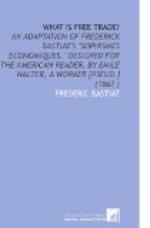“I consider an article is increased in value by passing through several processes of manufacture; but, in exchange, do two equal values cease to be equal because the one comes from the plough and the other from the power-loom?”
“I confess that I begin to think it singular that humanity should be ameliorated by shackles, or enriched by taxes: and, frankly, I should be relieved of a heavy weight, I should experience a pure joy, if I could see demonstrated, which the author assures us of, that there is no incompatibility between comfort and justice, between peace and liberty, between the extension of labor and the progress of intelligence.”
“So, without feeling satisfied by his arguments, to which I do not know whether to give the name of reasoning or of objections, I will interrogate the masters of the science.”
Let us terminate by a last and important observation this monograph of sophisms. The world does not know, as it ought, the influence which sophistry exerts upon it. If we must say what we think, when the Right of the Strongest was dethroned, sophistry placed the empire in the Right of the Most Cunning; and it would be difficult to say which of these two tyrants has been the more fatal to humanity.
Men have an immoderate love for pleasure, influence, position, power—in one word, for wealth.
And at the same time men are impelled by a powerful impulse to procure these things at the expense of another. But this other, which is the public, has an inclination not less strong to keep what it has acquired, provided it can and knows how. Spoliation, which plays so large a part in the affairs of the world, has, then, two agents only: Strength and Cunning; and two limits: Courage and Right.
Power applied to spoliation forms the groundwork of human savagism. To retrace its history would be to reproduce almost entire the history of all nations—Assyrians, Babylonians, Medes, Persians, Egyptians, Greeks, Romans, Goths, Franks, Huns, Turks, Arabs, Moguls, Tartars—without counting that of the Spaniards in America, the English in India, the French in Africa, the Russians in Asia, etc., etc.
But, at least, among civilized nations, the men who produce wealth have become sufficiently numerous and sufficiently strong to defend it.
Is that to say that they are no longer despoiled? By no means; they are robbed as much as ever, and, what is more, they despoil one another. The agent alone is changed; it is no longer by violence, but by stratagem, that the public wealth is seized upon.
In order to rob the public, it must be deceived. To deceive it, is to persuade it that it is robbed for its own advantage; it is to make it accept fictitious services, and often worse, in exchange for its property. Hence sophistry, economical sophistry, political sophistry, and financial sophistry—and, since force is held in check, sophistry is not only an evil, it is the parent of other evils. So it becomes necessary to hold it in check, in its turn, and for this purpose to render the public more acute than the cunning; just as it has become more peaceful than the strong.




